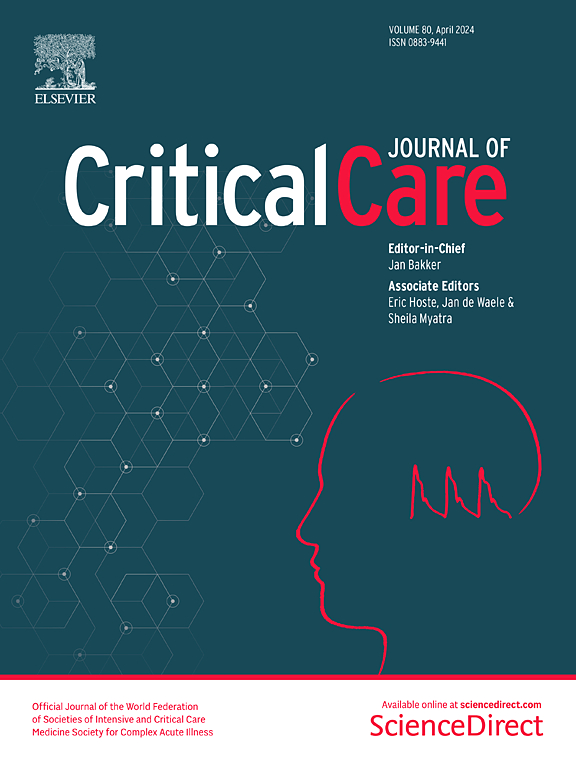基于重症监护病房的快速综合征PCR治疗医院获得性肺炎的成本-效果:吸气WP3多中心RCT分析
IF 9.3
1区 医学
Q1 CRITICAL CARE MEDICINE
引用次数: 0
摘要
医院获得性肺炎和呼吸机相关性肺炎(HAP和VAP)分别是在入院或插管后48小时发生的肺炎。通常,HAP/VAP患者在临床诊断时给予广谱经验性抗生素,在获得微生物学结果后48-72小时后进行改良。分子测试提供更快的结果,有可能改善病人的护理。为了研究这种潜力是否可以实现,我们进行了一项实用的多中心随机对照试验(‘吸气WP3 ’),比较了ICU HAP/VAP与标准护理的快速、综合征性聚合酶链反应(PCR)。由于分子检测的使用会对医院资源造成影响,因此在做出充分知情的决定时,必须考虑其潜在的性价比。因此,吸气WP3包括一个经济评估,在这里提出。其目的是评估icu内PCR (biomrieux BioFire FilmArray Pneumonia Panel)在HAP/VAP中的成本效益,告知是否在常规NHS护理中实施这种技术。我们收集了患者资源使用和费用的数据。这些数据与吸气WP3的两个主要结局指标相结合:24小时的抗生素管理和14天的临床治愈。采用回归模型进行成本-效果分析。敏感性分析探讨假设,亚组分析探讨差异影响。我们发现干预(PCR引导治疗)组的ICU总费用(包括PCR费用)较低。标准护理的平均费用为40,951英镑,而干预组的平均费用为33,149英镑,差异为- 7,802英镑(95% CI: - 15,696英镑,- 92英镑)。对于抗生素管理,pcr引导的治疗既便宜又比常规患者管理更有效。对于临床治愈,我们没有发现pcr引导治疗具有成本效益,因为干预组中治愈的病例较少。我们发现肺炎小组的ICU平均费用较低。肺炎小组在抗生素管理方面具有成本效益,但不是临床治愈。试验注册:于2019年8月5日注册为ISRCTN16483855。本文章由计算机程序翻译,如有差异,请以英文原文为准。
Cost-effectiveness of rapid, ICU-based, syndromic PCR in hospital-acquired pneumonia: analysis of the INHALE WP3 multi-centre RCT
Hospital-acquired and ventilator-associated pneumonia (HAP and VAP) are pneumonias arising > 48 h after admission or intubation respectively. Conventionally, HAP/VAP patients are given broad-spectrum empiric antibiotics at clinical diagnosis, refined after 48–72 h, once microbiology results become available. Molecular tests offer swifter results, potentially improving patient care. To investigate whether this potential is realisable, we conducted a pragmatic multi-centre RCT (‘INHALE WP3’) of rapid, syndromic polymerase chain reaction (PCR) in ICU HAP/VAP compared with standard of care. As the use of molecular tests impact on hospital resources, it is important to consider their potential value-for-money to make fully informed decisions. Consequently, INHALE WP3 included an economic evaluation, presented here. Its aim was to estimate the cost-effectiveness of an in-ICU PCR (bioMérieux BioFire FilmArray Pneumonia Panel) in HAP/VAP, informing whether to implement such technology in routine NHS care. We collected data on patient resource use and costs. These data were combined with INHALE WP3’s two primary outcome measures: antibiotic stewardship at 24 h and clinical cure at 14 days. Cost-effectiveness analyses were carried out using regression models adjusting for site. Sensitivity analyses explored assumptions and sub-group analyses explored differential impacts. We found lower total ICU costs (including PCR costs) in the intervention (PCR-guided therapy) group. Average costs were £40,951 for standard of care compared with £33,149 for the intervention group, a difference of − £7,802 (95% CI: − £15,696, £92). For antibiotic stewardship, the PCR-guided therapy was both less costly and more effective than routine patient management. For clinical cure, we did not find PCR-guided therapy to be cost-effective due to fewer cases being cured in the intervention group. We found lower average ICU costs with the Pneumonia Panel. The pneumonia panel was cost-effective in terms of antibiotic stewardship, but not clinical cure. Trial registration: Registered as ISRCTN16483855 on 5th August 2019.
求助全文
通过发布文献求助,成功后即可免费获取论文全文。
去求助
来源期刊

Critical Care
医学-危重病医学
CiteScore
20.60
自引率
3.30%
发文量
348
审稿时长
1.5 months
期刊介绍:
Critical Care is an esteemed international medical journal that undergoes a rigorous peer-review process to maintain its high quality standards. Its primary objective is to enhance the healthcare services offered to critically ill patients. To achieve this, the journal focuses on gathering, exchanging, disseminating, and endorsing evidence-based information that is highly relevant to intensivists. By doing so, Critical Care seeks to provide a thorough and inclusive examination of the intensive care field.
 求助内容:
求助内容: 应助结果提醒方式:
应助结果提醒方式:


